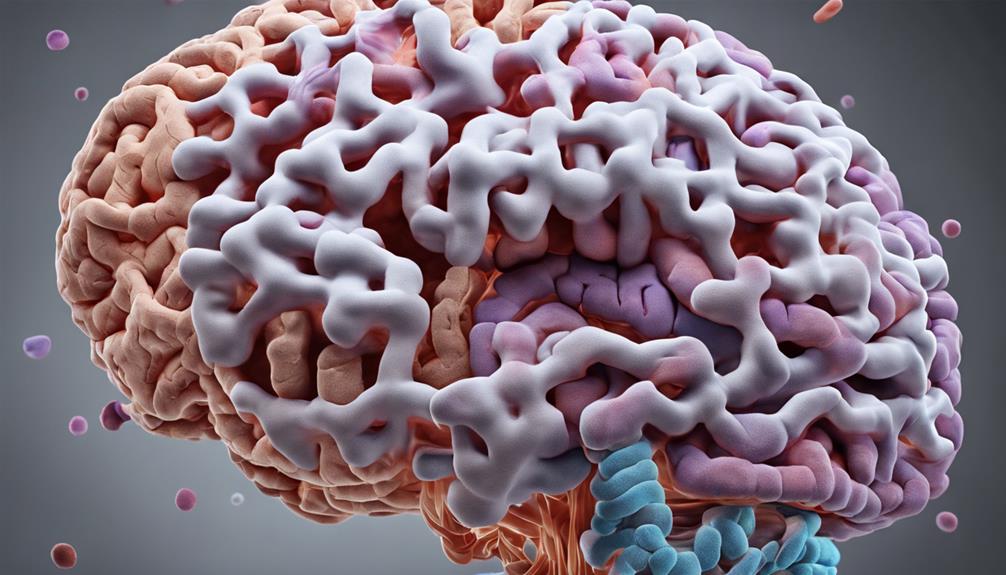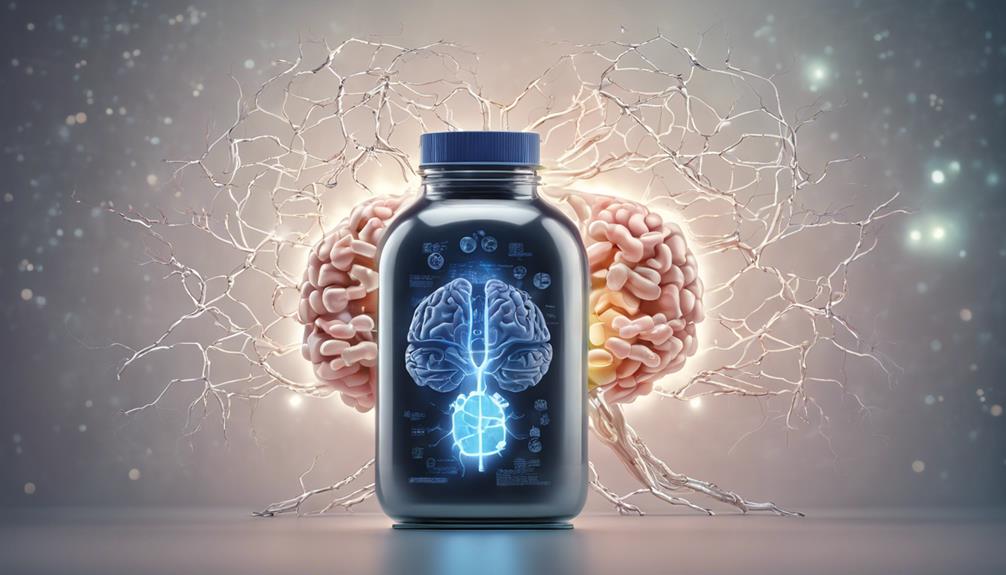We are here to explore the latest advancements in Alzheimer’s treatment, focusing on the recent release of Biogen’s groundbreaking medication.
This new medication has generated significant interest within the medical community for its potential impact on patients suffering from Alzheimer's disease.
The implications of this breakthrough are far-reaching, sparking discussions about the future landscape of Alzheimer's research and the possibilities it may hold for transforming treatment approaches.
Stay tuned to uncover the intricacies of this cutting-edge development and its implications for the future of Alzheimer's care.
Key Takeaways
- Aducanumab targets beta-amyloid plaques
- Improves cognitive function in Alzheimer's patients
- Accelerates Alzheimer's research and treatment development
- Promising potential to change course of Alzheimer's disease
The Science Behind Biogen's Drug

Exploring the intricate mechanisms of action underlying Biogen's Alzheimer drug reveals a promising avenue for therapeutic intervention in the realm of neurodegenerative diseases. The drug, aducanumab, functions by targeting and clearing beta-amyloid plaques, which are hallmark characteristics of Alzheimer's disease pathology. Through its monoclonal antibody structure, aducanumab specifically binds to these plaques, marking them for destruction by the immune system.
Moreover, Biogen's drug demonstrates a dual-action mechanism by not only removing existing beta-amyloid plaques but also preventing further plaque accumulation. This preventive aspect is crucial in halting the progression of Alzheimer's disease, as beta-amyloid buildup is known to contribute to neuronal damage and cognitive decline over time.
Potential Benefits for Alzheimer's Patients

The potential benefits of Biogen's Alzheimer drug for patients include its ability to target and clear beta-amyloid plaques, thereby aiding in the mitigation of cognitive decline associated with the disease. This novel drug has shown promising results in clinical trials, offering hope to individuals and families affected by Alzheimer's.
- Reduction of Beta-Amyloid Plaques: By targeting and clearing beta-amyloid plaques in the brain, the drug may help slow down the progression of Alzheimer's disease.
- Improvement in Cognitive Function: Patients treated with this drug have demonstrated improvements in cognitive function, including memory, reasoning, and problem-solving skills.
- Enhanced Quality of Life: The drug's ability to mitigate cognitive decline can lead to an overall improvement in the quality of life for patients and their caregivers.
- Potential Delay in Disease Progression: Early data suggests that the drug may help delay the progression of Alzheimer's disease, providing patients with more time before reaching advanced stages of the illness.
Impact on Alzheimer's Research

Our analysis indicates a significant advancement in Alzheimer's research due to the impact of Biogen's Alzheimer drug on beta-amyloid plaque clearance. This breakthrough has opened new possibilities for understanding the disease and developing more targeted treatments. By targeting beta-amyloid plaques, the drug has shown promising results in reducing their accumulation in the brain, which is a hallmark characteristic of Alzheimer's disease. This not only provides a potential treatment avenue for patients but also contributes valuable insights to the broader field of Alzheimer's research.
| Benefit | Description |
|---|---|
| Enhanced Understanding | Biogen's drug aids in unraveling the role of beta-amyloid plaques in Alzheimer's. |
| Targeted Treatment Development | The drug's success paves the way for more precise and effective treatment options. |
| Research Acceleration | Accelerates the pace of Alzheimer's research by providing a new focal point. |
Future of Alzheimer's Treatment

Building upon the advancements in Alzheimer's research catalyzed by Biogen's Alzheimer drug, the future of Alzheimer's treatment hinges on the continued exploration of innovative therapeutic strategies targeting key pathological mechanisms. To effectively address the complexities of Alzheimer's disease, the following approaches are crucial:
- Precision Medicine: Tailoring treatments to individual patients based on genetic, environmental, and lifestyle factors can enhance treatment efficacy and minimize adverse effects.
- Immunotherapy: Developing vaccines or antibodies that target and remove abnormal proteins implicated in Alzheimer's, such as beta-amyloid and tau, shows promise in halting disease progression.
- Neuroprotective Agents: Research into compounds that protect neurons from degeneration and promote brain health could lead to novel treatments that slow down or prevent cognitive decline.
- Combination Therapies: Combining different treatment modalities, such as medication, lifestyle interventions, and cognitive training, may offer synergistic benefits for managing Alzheimer's symptoms and improving quality of life.
Conclusion and Future Outlook

With the evolving landscape of Alzheimer's treatment strategies, a comprehensive understanding of innovative therapies and their potential impact on disease progression is paramount. As we look ahead, the future of Alzheimer's treatment appears promising with ongoing research and development efforts. One such advancement is the Biogen Alzheimer drug, which has shown potential in targeting underlying causes of the disease. Below is a table summarizing key points regarding the Biogen Alzheimer drug:
| Aspect | Details |
|---|---|
| Drug Name | Aducanumab |
| Mechanism of Action | Targets amyloid beta plaques in the brain |
| Clinical Efficacy | Demonstrated reduction in cognitive decline |
| Future Implications | Potential to change the course of Alzheimer's |
As we move forward, continued research into Alzheimer's disease and potential treatments like the Biogen drug will be crucial. By staying informed and supporting advancements in Alzheimer's care, we can strive towards better outcomes for individuals affected by this challenging condition.
Frequently Asked Questions
What Are the Potential Side Effects of Biogen's Alzheimer Drug?
When considering potential side effects of a medication, it's crucial to examine the drug's known adverse reactions. These can range from mild symptoms like headaches or nausea to more severe issues such as allergic reactions or organ damage.
Understanding the risks associated with a drug is essential for making informed decisions about treatment options. Always consult with a healthcare provider for personalized advice regarding potential side effects of any medication.
How Does Biogen's Drug Compare to Other Treatments Currently Available for Alzheimer's Patients?
Comparing Biogen's drug to existing Alzheimer's treatments reveals a nuanced landscape of varying efficacy and side effect profiles. Our analysis highlights the need for personalized medicine in Alzheimer's care, tailoring treatments to individual patients.
Is There a Specific Target Population for Biogen's Drug, Such as Early-Stage Alzheimer's Patients or Those With a Certain Genetic Predisposition?
In determining a specific target population, we analyze various factors such as disease progression, genetic markers, and treatment efficacy. Identifying early-stage Alzheimer's patients or those with a particular genetic predisposition may influence drug effectiveness.
Tailoring interventions to these subgroups can optimize outcomes and enhance patient care. Understanding the nuances of target populations allows for personalized medicine strategies to be implemented, ultimately improving treatment precision and individual health outcomes.
How Long Has Biogen's Drug Been in Development and What Is the Timeline for Potential FDA Approval?
In terms of drug development timelines, it typically takes around 10-15 years from initial research to potential FDA approval. This process involves rigorous testing for safety and efficacy.
The timeline can vary based on the complexity of the treatment and the results of clinical trials. Each stage, from preclinical studies to post-market surveillance, is crucial in ensuring the drug's effectiveness and safety for patients.
Are There Any Ongoing Clinical Trials or Studies Related to Biogen's Alzheimer Drug That Patients Can Participate In?
Yes, there are ongoing clinical trials and studies related to potential treatments for Alzheimer's disease that patients can participate in.
These trials aim to evaluate the safety and efficacy of new medications or interventions in the hopes of advancing our understanding and treatment options for this condition.
Participating in clinical trials can provide patients with access to cutting-edge therapies and contribute to the advancement of medical science.
What are the Potential Benefits of Biogen’s Alzheimer Drug for Patients like Pat Bowlen?
Biogen’s Alzheimer drug brings hope to patients like Pat Bowlen. The potential benefits of the drug lie in slowing down the progression of Pat Bowlen’s Alzheimer’s battle, improving cognitive function, and enhancing quality of life. This groundbreaking treatment offers a glimmer of optimism for those affected by the disease.
Conclusion
In conclusion, Biogen's Alzheimer drug offers a glimmer of hope for patients and researchers alike. Its potential benefits are groundbreaking, with the potential to revolutionize the treatment of this devastating disease.
The impact on Alzheimer's research can't be overstated, paving the way for new advancements in the field. The future of Alzheimer's treatment looks brighter than ever before, with this drug leading the charge in the fight against this debilitating condition.










